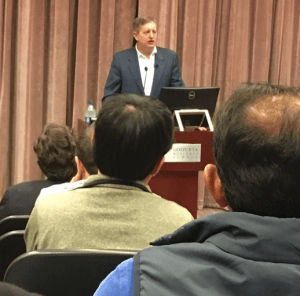Real-Life star of The Big Short visits Goizueta
 One of the many advantages of Goizueta is the number of high-caliber guest speakers our professors invite to classes to provide perspective and real life experience. In April, we had the opportunity to hear Steven “Steve” Eisman speak to our full-time Global Macroeconomic Perspectives class. Eisman, immortalized on the big screen by Steve Carrell in The Big Short and one of the primary subjects of Michael Lewis’ book by the same name, spoke to our class about his experiences during the events leading up to the housing crisis and answered questions about his view of the future.
One of the many advantages of Goizueta is the number of high-caliber guest speakers our professors invite to classes to provide perspective and real life experience. In April, we had the opportunity to hear Steven “Steve” Eisman speak to our full-time Global Macroeconomic Perspectives class. Eisman, immortalized on the big screen by Steve Carrell in The Big Short and one of the primary subjects of Michael Lewis’ book by the same name, spoke to our class about his experiences during the events leading up to the housing crisis and answered questions about his view of the future.
Mr. Eisman gave a quick history on the concept of the subprime mortgage and explained the environment that led up to the crisis. He specifically addressed how it was possible so few people predicted what was coming as major players were swept up in the momentum and became victim to hubris based on past successes. While Mr. Eisman attempted to sound the alarm about subprime mortgages and the vulnerability they had created in the market, he simply could not make people listen because they were using past information to predict the future without fully comprehending how the facts had completely changed.
While Mr. Eisman attempted to sound the alarm about subprime mortgages and the vulnerability they had created in the market, he simply could not make people listen because they were using past information to predict the future without fully comprehending how the facts had completely changed. His major piece of advice fits perfectly into any situation: understand your paradigm, what assumptions you are making, always question and think outside the box.
While Mr. Eisman’s portrayal in the film showed a very frustrated person, his perspective today is much more optimistic about the long-term outlook of the financial markets in the U.S. — with some caveats. He provided insight into different controversial regulations, and what effect they have had versus what the perceived effect has been.
One thing that especially struck me about Eisman was his sense of humor, his willingness to be blunt, and how well-rounded he was. Not only has he had an impressive career as an investor, but he proudly told us about his comic book collection of over 6,000 books (no preference between D.C. and Marvel, by the way).
I particularly enjoyed how his points also connected to other classes I have taken at Goizueta, including Managerial Accounting and Leading with Integrity, such as the idea of proper incentive systems and how to balance them with ethics.
